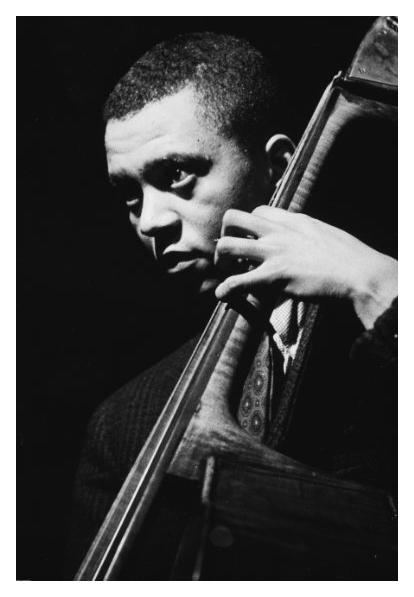From 1954 on through 1955, he gained significance touring with such musicians as Bennie Green, Paul Quinichette, George Wallington, J. J. Johnson and Kai Winding. In 1955 he joined the Miles Davis quintet, staying on with the group until 1963 and appearing on the 1959 classic Miles Davis album Kind of Blue. One of Paul’s most noted performances was on that album’s first cut, “So What,” which opens with a brief duet with pianist Bill Evans.
Possessing one of the most immediately recognizable bass playing sounds and styles, Paul Chambers played bass in the Miles Davis quintets and sextets from the mid-’50s through the early ’60s. From 1963 until 1966 Chambers played often with the Wynton Kelly trio, also freelancing as a sidemen for other important names in jazz all throughout his career.

Over his lifetime Paul Chambers developed addictions to both alcohol and heroin. On January 4, 1969 he died of tuberculosis at the premature age of 33.
His accompaniment and solos with Davis and other leaders remain distinctive and influential. He and Slam Stewart were among the first jazz bassists to perform arco or bowed features.
Paul Chambers played on a great many albums during the period he was active including such landmark albums as John Coltrane’s Giant Steps. Many musicians wrote songs dedicated to Paul. John Coltrane’s song “Mr. P.C.” is named after Chambers. Tommy Flanagan wrote “Big Paul”, which was performed on the John Coltrane and Kenny Burrell Prestige 1958 LP. Max Roach wrote a drum solo called “Five For Paul”, on his 1977 “impossible to find” Solos drum solo LP recorded in Japan. Sonny Rollins wrote a song called “Paul’s Pal” for him as well, and finally, long time fellow bandmate with Miles Davis, pianist Red Garland wrote the tune “The P.C. Blues”。
A hard drinker and frequent drug user, Chambers died from tuberculosis in 1969 at the age of thirty-three.

